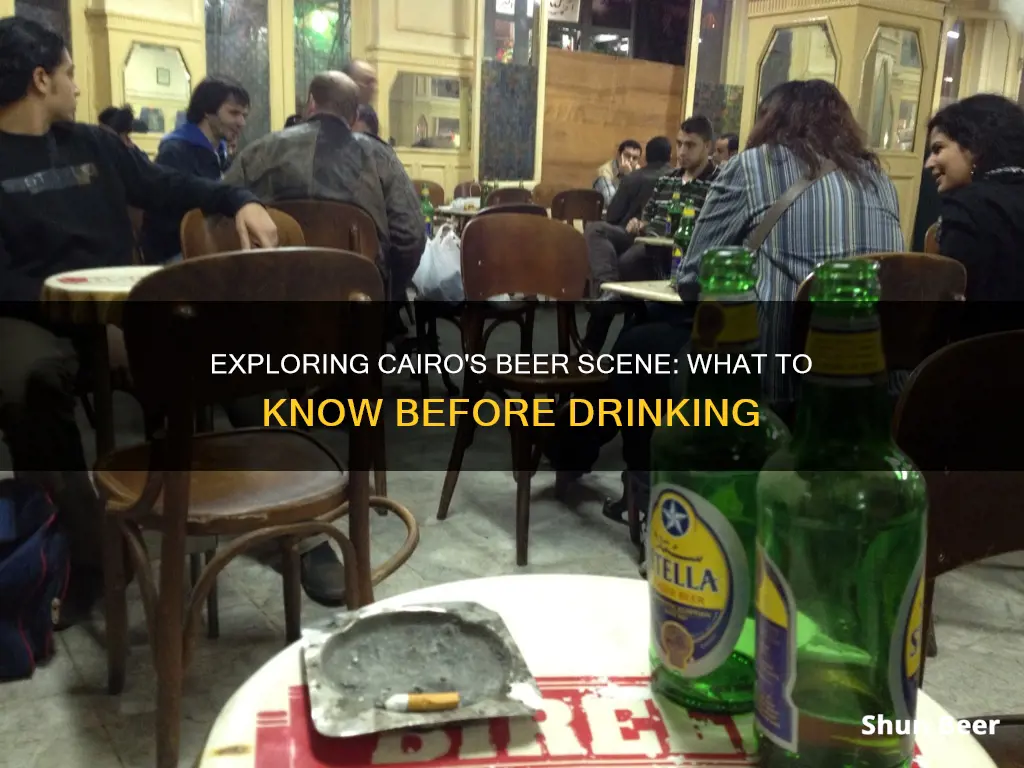
Drinking alcohol in Egypt is complicated. As a predominantly Muslim country, many locals abstain from alcohol completely. However, alcohol, specifically beer, has a long history in the country, dating back to ancient Egypt, where it was a cornerstone of society and spirituality. Today, beer remains the most popular alcoholic beverage in Egypt, with the country's beer industry founded by Belgian businessmen in 1897. In Cairo, liquor stores and bars can be found in some upmarket neighbourhoods, and many hotels and resorts serve alcohol.
| Characteristics | Values |
|---|---|
| Beer in Cairo, Egypt | Beer has been a significant part of Egyptian culture since ancient times. In Cairo, the consumption and sale of alcohol, including beer, are regulated due to the country's predominantly Muslim population. However, it is possible to find liquor stores, bars, and hotels serving alcoholic beverages in certain areas. |
| Beer Availability | Stella is the most famous and beloved brand of beer in Egypt, with other options like Sakara, Meister, and Luxor Lager. |
| Beer Culture | Beer was introduced to the Egyptians by the god Osiris, according to legend. In ancient times, beer was a staple for the working class, while wine was preferred by the upper class. |
| Drinking Culture | Public drunkenness is unacceptable in Egypt, and alcohol sale and consumption are prohibited during certain religious periods, such as the Prophet Mohammed's birthday and Ramadan. |
| Alcohol Regulations | Alcohol is regulated in Egypt, balancing respect for Islamic traditions and diverse practices. It is available in most tourist areas during Ramadan but with discretion advised. |
What You'll Learn
- Beer in Egypt is popular and has a long history, dating back to the Predynastic period
- Alcohol sale and consumption are regulated in Egypt, balancing respect for Islamic traditions and diverse practices
- Tourists can drink alcohol in Cairo, but it is important to be mindful of local customs and sensibilities
- Cairo has a vibrant nightlife, with various clubs and bars, but it is more subdued compared to Western cities
- Public intoxication is frowned upon in Egypt and can lead to legal issues

Beer in Egypt is popular and has a long history, dating back to the Predynastic period
The ancient Egyptians produced and consumed beer in huge volumes, and it was treated principally as a type of food. It was consumed daily and in great quantities at religious festivals and celebrations. Beer was also used as compensation for labour, with workers at the Giza plateau, for example, given beer rations three times a day as payment. Beer was also frequently prescribed in medical texts, believed to "gladden the heart" and confuse evil spirits, which were considered the cause of many diseases.
The process of making beer was closely linked to bread-making, and this nutritious, sweet, and thick beverage was key to daily life and religious ceremonies. Beer was made by mixing cooked loaves of bread with water and placing the mixture in heated jars to ferment. Dates and honey were added for sugar, taste, and higher alcohol content, and then yeast was added to increase fermentation. This produced a thick, dark red brew. Later, during the New Kingdom, barley and emmer (wheat) were used, mixed with water to create a mash, which was then heated to ferment. This mixture was strained, and different herbs and fruits were added for flavouring.
The ancient Egyptians were so well-known for their brewing skills that their fame eclipsed the actual inventors of the process, the Sumerians. Classical Greek writers credited the Egyptians with inventing beer, and even the wine-loving Romans praised Egyptian beer. Beer was so important to the ancient Egyptians that it was regularly included in the grave goods complex, considered essential for existence in the afterlife.
Today, beer remains the most popular alcoholic beverage in Egypt by far, accounting for 54% of all alcohol consumption. The most popular beer is Stella, with 47.5 million litres sold in 2016 (equivalent to a third of Egypt's total beer consumption). Non-alcoholic beers are also very popular, as observant Muslims tend to avoid alcohol due to religious restrictions.
Understanding the Beer Guarantee: What's the Deal?
You may want to see also

Alcohol sale and consumption are regulated in Egypt, balancing respect for Islamic traditions and diverse practices
Alcohol sale and consumption in Egypt are regulated, balancing respect for Islamic traditions and diverse practices. As a predominantly Muslim country, many locals abstain from alcohol completely. However, it is possible to find liquor stores and bars in some upmarket neighbourhoods, and many hotels and resorts serve alcohol.
Egypt has a long history of beer brewing, and it is said that beer was introduced to the Egyptians by the god Osiris. In ancient Egypt, wine was preferred by the upper class, whereas beer was a staple for working-class Egyptians and a central part of their diet. Beer, known as 'hqt' and 'zythus', transcended social classes, being a daily sustenance for labourers and a revered offering for gods.
The modern beer industry in Egypt was founded by Belgian businessmen in 1897, with the establishment of Crown Brewery in Alexandria and later the Pyramid Brewery in Giza. Both breweries produced and sold a beer named Stella, which remains the most popular beer in Egypt.
Today, there are strict laws governing the production of Egyptian beer, and some consider it to be one of the best in the world due to the fine raw materials available in the country. Alcoholic beverages are much less expensive than imported ones, making them a popular choice for tourists.
While alcohol is available in most urban areas, it may be limited or prohibited in certain regions, such as the Western Desert oases. Additionally, the sale of alcohol is prohibited on the Prophet Mohammed's birthday and during the month of Ramadan, except in a few places catering to tourists. Public drunkenness is unacceptable and is considered a breach of respect for public spaces and decorum.
Enjoying Beer at Football Games: What's the Deal?
You may want to see also

Tourists can drink alcohol in Cairo, but it is important to be mindful of local customs and sensibilities
In ancient Egypt, alcohol was deeply ingrained in society and spirituality. Beer, known as 'hqt' and 'zythus', was a daily staple for laborers and a revered offering to the gods. Wine, on the other hand, was the elixir of the elite, treasured by the nobility and used in sacred rituals. This contrast between the ubiquity of beer and the exclusivity of wine offers a glimpse into the social hierarchy of ancient Egyptian society.
Today, alcohol remains a part of Egyptian culture, although its consumption is not as widespread as in Western countries. Cairo, the vibrant capital city, offers a unique window into the local entertainment scene, with a variety of clubs and bars. While the nightlife in Cairo may be more subdued compared to Western cities, it provides an opportunity to engage with Egypt's contemporary culture while respecting local traditions.
When drinking in Cairo, it is essential to be mindful of local customs and sensibilities. Public intoxication is strongly discouraged and considered a breach of respect for public spaces and decorum. The hot and dry climate of Egypt can also intensify the effects of alcohol, so moderation is key to avoiding unpleasant hangovers.
Additionally, it is worth noting that alcohol availability can vary across the country. In urban areas like Cairo, accessing alcohol is relatively easier, while in more remote regions like the Western Desert oases, it may be limited or absent.
For tourists looking to indulge in alcoholic beverages during their stay in Cairo, there are a few options. Alcohol can be purchased at liquor stores, bars, pubs, discos, and restaurants throughout the city. Many hotels, especially larger ones, also offer a selection of foreign and domestic beer, wine, and spirits. However, it is important to note that alcohol prices in hotels may be significantly higher than in other establishments.
When it comes to beer, the most famous brand in Egypt is Stella, produced by the Al Ahram Beverages Company. It has been a staple in the country since the 19th century and is widely available in bars and restaurants. Other popular options include Sakkara, a newer brand known for its modern brewing technology, and Luxor Lager, available in "classic" and "gold" varieties.
In conclusion, while tourists can drink alcohol in Cairo, it is crucial to be respectful and mindful of local customs and sensibilities. By understanding the cultural nuances surrounding alcohol consumption in Egypt, tourists can ensure they have an enjoyable and culturally sensitive experience during their stay in this fascinating country.
Is Day-Old Beer Safe to Drink?
You may want to see also

Cairo has a vibrant nightlife, with various clubs and bars, but it is more subdued compared to Western cities
Cairo, Egypt, has a vibrant nightlife scene with various clubs and bars to choose from. However, compared to Western cities, the atmosphere is more subdued. While alcohol is available in Cairo, Egypt's predominantly Muslim culture means it is not central to everyone's social life.
Egypt has a long history of alcohol consumption, dating back to ancient times. In ancient Egypt, beer was a daily staple for labourers, while wine was considered an elite beverage. This cultural and historical journey of alcohol in Egypt is fascinating, with beer and wine playing a significant role in the country's social and spiritual life.
Today, alcohol remains readily available in Cairo, especially in cosmopolitan areas and tourist resorts. The modern beer industry in Egypt was established in 1897 by Belgian businessmen, and the country now has several major breweries. Local beers, such as Sakkara and Luxor Lager, are widely consumed and offer a taste of Egypt's brewing heritage.
Cairo's nightlife provides a unique perspective on Egypt's contemporary culture. While it may not be as lively as Western cities, it offers an opportunity to engage with local customs and sensibilities. Public intoxication is highly frowned upon and considered a breach of respect for public spaces and decorum.
Egypt's relationship with alcohol is complex, balancing between tradition and globalisation. The availability and consumption of alcohol vary across the country, with urban areas having easier access than rural regions. The climate also plays a role, with alcohol's effects intensified by the heat, making moderation crucial.
Post-Hysterectomy: Beer Drinking and Recovery
You may want to see also

Public intoxication is frowned upon in Egypt and can lead to legal issues
Alcohol has a long history in Egypt, dating back to ancient times when beer was a staple for working-class Egyptians and wine was preferred by the upper class. Today, Egypt is a predominantly Muslim country, and while alcohol is legal, its sale and consumption are regulated and frowned upon by many locals. Public intoxication is particularly discouraged and can even lead to legal issues.
Egypt's complex relationship with alcohol stems from its diverse cultural and religious landscape. While the country has a rich history of beer brewing and alcohol consumption, the Muslim conquest brought religious restrictions and conflicting views on alcohol. Despite this, the consumption of beer continued, and it remains the most popular alcoholic beverage in Egypt. The country's modern beer industry was established by Belgian businessmen in the 19th century, and today, major breweries like Al Ahram Beverages Company produce a variety of local and international beer brands.
Tourists and locals can purchase alcoholic beverages in Egypt's cosmopolitan cities and tourist resorts. Liquor stores, bars, pubs, discos, and restaurants serve alcohol, although availability may vary depending on location. For example, in the Western Desert oases or Middle Egypt, alcohol sales are prohibited or restricted. Additionally, alcohol sales are prohibited on the Prophet Mohammed's birthday and during the month of Ramadan, except in a few places catering specifically to tourists.
While alcohol is accessible in Egypt, public intoxication is strongly discouraged. Being drunk in public is considered a breach of the respect traditionally afforded to public spaces and decorum. It is essential for visitors to understand and respect local customs and sensibilities, especially when consuming alcohol. Responsible drinking is crucial, as public intoxication can lead to legal consequences.
To navigate Egypt's alcohol landscape responsibly, it is advisable to be mindful of cultural nuances and local laws. Alcohol is best enjoyed in designated spaces like bars, pubs, and restaurants, rather than in public areas. Additionally, it is important to stay hydrated, as Egypt's hot and dry climate can intensify the effects of alcohol, leading to dehydration and severe hangovers.
Beer After Laparoscopic Gastrectomy: What You Should Know
You may want to see also
Frequently asked questions
Yes, you can drink beer in Cairo, Egypt. Alcoholic beverages, specifically beer and wine, were a staple of the ancient Egyptian diet. Beer is widely available in Cairo, and the country's most famous brand of beer, Stella, has been manufactured in Egypt since the 19th century.
It is unclear what the legal drinking age is in Egypt. However, public intoxication is frowned upon and can lead to legal issues.
Some popular beers in Egypt include Stella, Sakkara, Heineken, Desperados, and Fayrouz (non-alcoholic).







